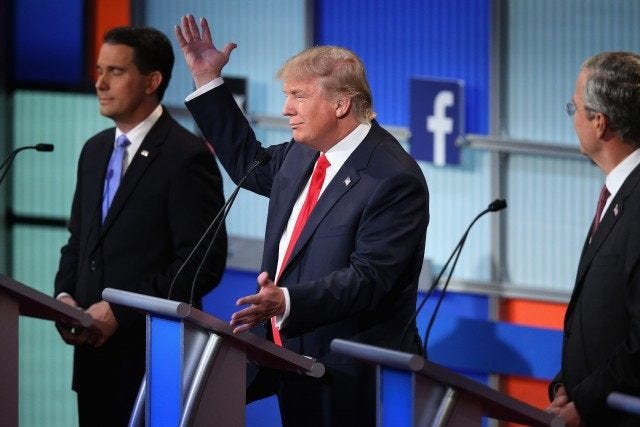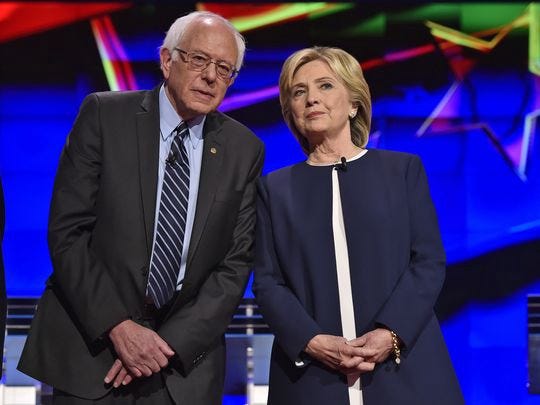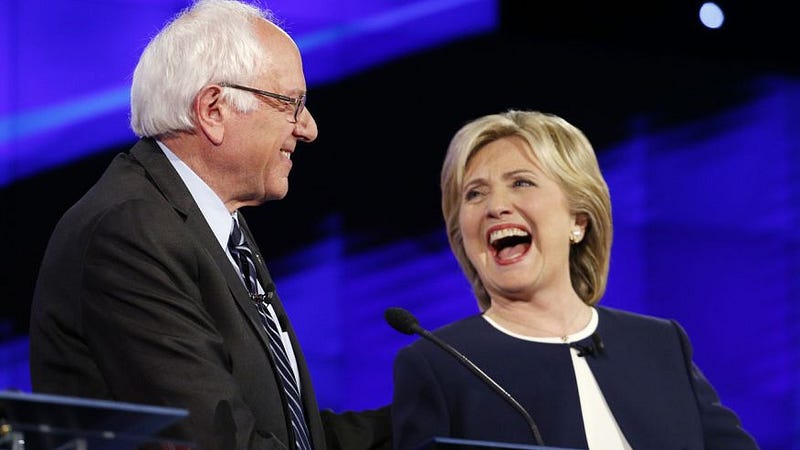You’re not so different after all
The Republican debate on Thursday, March 3, was an instructive moment in American politics. Viewers watched as the GOP establishment attacked the front runner Donald Trump in a coordinated effort and ended with every candidate on the stage re-pledging to support the billionaire if and when he becomes the nominee.
Before anyone on the left starts making hay, though: Bernie Sanders already did the exact same thing for Hillary Clinton back in late 2014. Sanders swore, before his campaign even began, that he would support the likely Clinton general election candidacy.
The American political duopoly does not allow for principled independence.
For the GOP, forcing Republican candidates for the presidential nomination must have seemed like a stroke of genius back in August. At that time, a Trump nomination didn’t seem realistic. Party elders thought they could end a Trump independent bid for the presidency by forcing a public pledge during a prime-time debate.
Things didn’t work out the way the GOP establishment wanted them to. Trump not only refused to pledge allegiance to party over self in August (he later recanted), he actually gained support in the aftermath of that public stand. It’s support that has continued, despite the efforts of party brass and his two closest challengers Marco Rubio and Ted Cruz.
Now, all three candidates sharing the limited real estate on the Republican stage- Cruz, Rubio, and John Kasich- have pledged once again that they will support Trump if and when he is the GOP nominee.
Many liberals have pointed out the hypocrisy in spending two hours tearing down an admittedly repulsive politician, only to end those hours by pledging to support him in the event of his nomination. And they are right- this is the lowest form of hypocrisy and craven partisan pandering.
A vote for Rubio, Cruz, or Kasich is a vote for Trump.
Unfortunately, if a begrudging pledge by Trump’s fellow Republicans to support him in the general election renders their criticism of him toothless, then what does that say about a pledge by an Independent Senator from Vermont whose candidacy is ostensibly based on striking terror in the hearts of the Democratic establishment?
Or, to put it a different way: If Sanders wants to “highlight differences between himself and Democratic front-runner Hillary Clinton” on issues relating to party orthodoxy re free trade and the corporatocracy, that’s fine as long as he doesn’t pretend those differences really mean anything. Because they don’t if the nominal socialist plans to endorse Clinton anyway, with no conditions- which is, again, exactly what he promised to do.
It puts the lie to Sanders’ declaration that he and Clinton are “trying to treat the American people with intelligence.” Sanders is selling his supporters out to a different degree than other sheepdog Democrat candidates before him by promising to support the eventual Democratic nominee and not to run third party; his nominal independence could have left the possibility open but he closed the door on it before he even announced his candidacy.
A vote for Sanders is a vote for Clinton.
This leaves Sanders supporters with two viable ideological options: Either their candidate runs third party, in which case he is at least as much a liar as Clinton; or he endorses her and is a toothless Democratic Party shill whose candidacy only exists to shepherd unenthusiastic progressives to the party and Clinton.
These are similar to the two options that face the Republican electorate: Either their candidates reject the buffoonery and flirtation with white nationalism that the Trump campaign has begun to represent; or they agree to endorse him in the event he wins the nomination, rendering all their complaints meaningless.
The latter is the realistic choice for each party. And that will only lead to more disillusionment and anger, because even in the face of the public’s utter rejection of establishment politics and partisan power plays, the duopolistic political machine continues onward into the future, crushing hope and idealism under the weight of its well funded heels. Sanders or Rubio, Clinton or Trump- it makes no difference in the end.
As long as the American electoral system is allowed to run as a duopoly, rhetoric and movements within the two parties will be empty and fail to create any alternative to the political system. The empty promise of the Sanders candidacy and the craven refusal to buck party bosses by the non-Trump GOP candidates makes this crystal clear.
The partisan adherence to party loyalty is everything that is wrong with modern American politics in our modern era.






